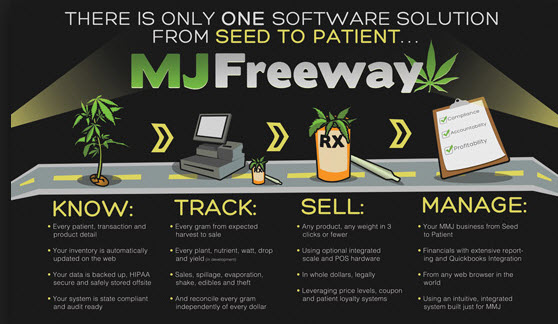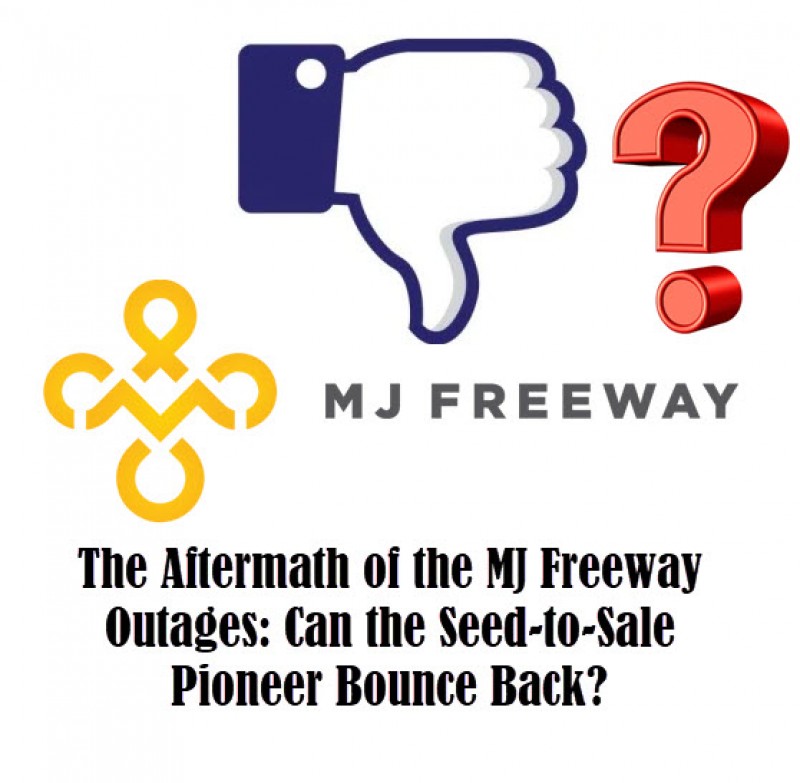The Aftermath of the MJ Freeway Outages: Can the Seed-to-Sale Pioneer Bounce Back?
Despite some lucrative contracts and agreements, this has not been a good year for MJ Freeway. Frequent outages and data breaches rendered their service unusable, leading to the obstruction of the entire Keystone State program before it even started. These unfortunate events were added to a growing list of problems that the seed-to-sale company faces, including their failure to run in several states, as well as cyber attacks.
The pioneering company that coined the term seed-to-sale, was discontinued as the official tracking software of the state of Nevada, only 18 months into their contract. The decision was announced mid-September and came to power this week. Reports covering the issue were quick to note that this year has been brutal for MJ Freeway. But will they be able to bounce back?
The History of MJ Freeway and Seed-to-Sale Software
The history of seed to sale software begins with MJ Freeway, as the company literally created the concept of tracking in 2010. Their innovative approach quickly became a standard measure for the cannabis industry, which was badly in need of more credibility. As the market continues to grow, competitors such as Viridian, Franwell, and BiotrakTHC were quick to capitalize on the mistakes made by MJ Freeway.
Software as a Service (SaaS) in the cannabis industry is an instrumental tool in fighting the rampant black market. “Seed-to-sale reporting is an important step for bringing legitimacy to the nascent cannabis industry, as well as helping businesses navigate the often byzantine regulations on a state-by-state basis”, said Jeremy Berke, a columnist for Business Insider.
Despite the hardships, MJ Freeway still holds onto the biggest slice of the market, with more than 40% of legal cannabis operations in the US. Over the course of seven years, MJ Freeway has expanded into the regulation of cannabis markets in twenty-three states and five countries. The company has only recently landed a $10M deal with the State of Pennsylvania, while they also agreed to overhaul Washington’s longsuffering program, landing $3 million in funding for their expansion plans.
MJ Freeway’s software is specifically designed to be compliant with state regulations. Therefore, the company often tracks the data involved in all chains of cannabis production, distribution, retail or wholesale, essentially pulling way much more weight than they can handle. As the industry is growing, so is pressure from local authorities, who want the software to be as reliable as possible.
Where the Problems Started
When so many businesses rely on just one program to maintain a certain standard of service, a sudden blackout means that chaos will ensue. And this is exactly had happened when MJ Freeway went dark a few days ago. Retailers had to revert to the archaic method of manual data entry; a painstaking process in such a highly regulated industry, where every little piece of information must be included.
However, this outage was not the first instance of MJF’s service failure. In January 2017, MJ Freeway was hacked, resulting in a major crash of MJ Freeway’s point-of-sale system. The crash lasted for a week, leading to confusion and errors. Although the platform recovered their data, the damage was already done. MJF’s reputation has started to crumble.
In June a source code leak lead led to a second security breach. This is when things started to really look bad for MJ Freeway, as industry experts were skeptical about the company’s control over their own platform. Connor Penhale, CEO of the consulting firm Compliant Cannabis stated that “Once that risk is there, you’ve got a threat. Based on the track record that MJ Freeway has – do I feel confident that they can handle this one more big thing that they have on their plate?”

MJ Freeway’s Response to the Controversy
Amy Poinsett and Jessica Billingsley (CEO and COO of MJF respectively), faced all the negative press and asked for support in the face of multiple investigations and technical problems. The company initially released a video statement in which Poinsett explained that some of the problems were caused due to outdated software. However, the video was soon deleted.
Jessica Billingsley explained: “What we need to do is to work to transition our existing, legacy customers to our new platform because it’s a much-improved product and not as susceptible to this type of issue. It is not an exaggeration to say that we have spent more on security in a [fiscal] quarter than most of our competitors’ gross in a quarter.”
The Washington Program Delay
The Washington Cannabis Program might eventually be the biggest flop of the company yet. Washington’s regulative authority has already replaced the BioTrackTHC system with a METRC system by Franwell at the end of October. Franwell eventually annulled the contract, leaving MJ Freeway as Washington’s only choice.
MJ Freeway’s Washington program, Leaf Data Systems was set to go live on November 1st, however the previous week the State had to announce that it will be postponed due to technical issues.
Media reaction was quick and relentless. Spokane’s Spokesman-Review stated that the delay was a “Database Detour.” On a more dramatic tone, Ganjapreneuer labeled the Washington setback a “Cannabis Armageddon Seed to Sale Halloween Scare.” David Busby’s Washington-based compliance software provider WeedTraQR remarked in its July blog that “Leaf Data system is barely ready for prime time … we’re predicting disaster.”
The program has now been scheduled to go live by January 2018. Meanwhile, the situation leaves at least 25% of the state’s cannabis business hanging in the balance. Retailers will lose hundreds of work hours copying and filing piles of paperwork or entering and transposing a series of figures into a series of Excel spreadsheets, while the rest will use some other commercial solution, like BioTrakTHC.
Amidst a sea of controversy and with BiotrakTHC reluctant to undertake the project, authorities state that they are satisfied by MJF’s efforts. In an attempt to divert media speculation that the system might be abused or result in diversion to out-of-state markets, Brian Smith, spokesman for the Washington State Liquor and Cannabis Board (LCB) stated, “We’re very pleased with MJ freeway and the work that they’re doing.”
What’s Next for MJ Freeway
This crisis is a lot to handle for MJF, who are now trying to remain optimistic in the face of looming catastrophe. “We understand our clients’ frustration and we apologize for the inconveniences,” Poinsett stated. Billingsley further added “We’re not in this business for short-term wins. While we’ve been first to market, we’ve also been first to stumble (…) We literally invented seed-to-sale software, patented it. And all we do is to strive to do the right thing for our clients, to be part of the solution and to show the industry that we care.”
OTHER STORIES YOU MAY ENJOY...
SOFTWARE TO HELP PICK MARIJUANA STRAINS, CLICK HERE.







